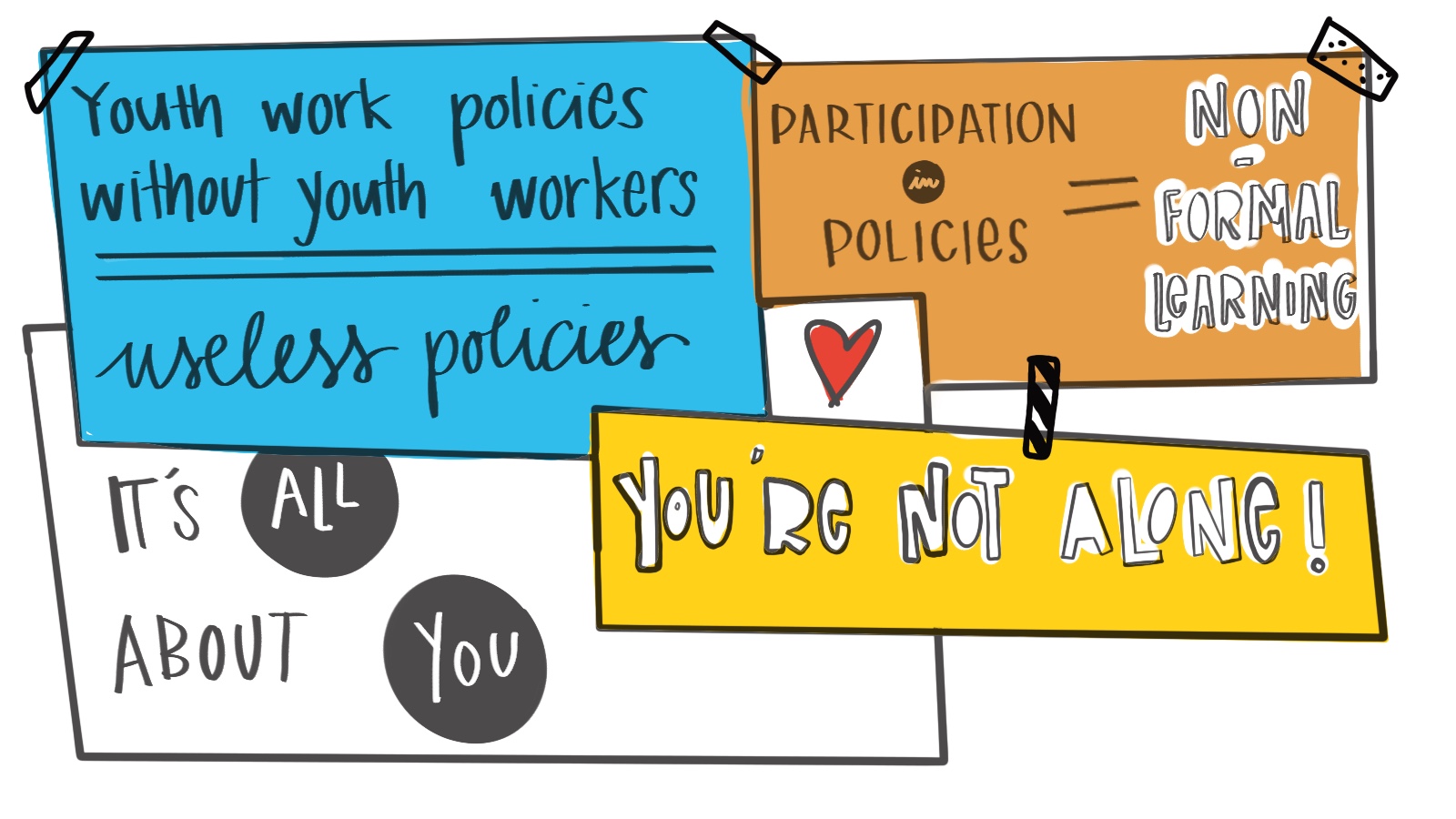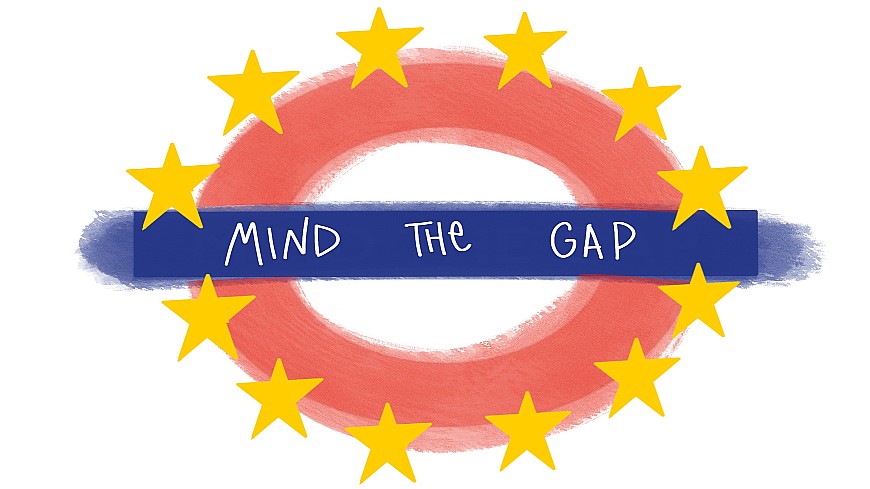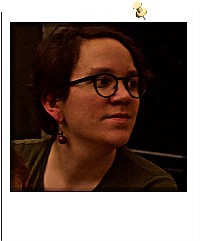Mind the gap!
Preparing the Flemish-Belgian national delegation for the digital EYWC and take-home messages for the future from the process
By Rilke Mahieu
20/06/2021
 Summary
Summary
At the 3rd European Youth Work Convention (EYWC), the wider European youth work community of practice was invited to take ownership of the European Youth Work Agenda, and to point out the steps needed to set the implementation of this agenda into motion, from the local to the European level.
A major question, however, is: how to make sure youth work community members whose daily work is not focused on the European (policy) level – that is, the overall majority, after all – also feel engaged and competent to participate in such European consultation processes and to participate in a meaningful way?
In this article, I highlight how we – JINT (the National Agency for Erasmus+ Youth and the European Solidarity Corps), De Ambrassade (the national youth work support centre) and the Flemish Department of Youth, Culture and Media – addressed this matter in Flanders, Belgium, when preparing for the 3rd EYWC.
 Mind the gap(s)!
Mind the gap(s)!
While the digital turn of the EYWC presented challenges in terms of engagement and participation, I want to touch upon another point here: for many youth workers, participation in an event such as the EYWC is a big step to take.
If you don’t believe this, I have a challenge for you: step up to a (fellow) youth worker, non-formal educator or any other youth practitioner active at the local, regional or national level and ask what they know and think about European youth (work) policies. Most likely, their gaze will turn blank, they will frown insecurely, shake their head in confusion and answer with a combination of the following sentences:
- “Honestly, I have no idea. I must confess I’m not really informed about what Europe does. I didn’t know there was something like a European youth strategy or youth work agenda.”
- “I’m not sure if Europe has any impact on my organisation, my job and on the young people I’m working with. I don’t see how I can have any impact on those policies, it’s a farfrom-my-bed show.”
- “But youth work contexts across Europe differ so much. Does it even make sense to create a European approach to youth work?”
- “I’m a practitioner, I’m not into politics at all. I don’t have anything to do with it, so why should I have an opinion about it? I'd rather leave policy making to the policy makers, it’s their job.”
Generally, there is a lack of knowledge about and sense of connection to this European level, and in many cases, a lack of understanding about youth work practices in other European countries too. To be sure, the problem is not that Flemish (or other) youth work practitioners are too lazy to inform themselves about European youth (work) policies and developments. Rather, I would argue it is one of the plentiful manifestations of the (perceived and/or real) gap between European institutions and their policies, on the one side, and European citizens, on the other.
One culprit here is the vague Euro-jargon, detached from practitioners’ experience-based, contextualised vocabulary and viewpoints. Because, how can you participate meaningfully when you seem to lack a common language? On top of that, European policy processes are complex, slow and difficult to impact upon. So not exactly something most youth workers, who are usually driven by a desire to affect young people more directly, are most passionate about. Finally, EU policies are largely invisible to the wider public. Or have you ever seen any public media coverage in your country on EU youth-related policies beside the widely known Erasmus+ programme for students? As a result of all these elements, even youth workers who are interested in European youth (work) policies often feel overwhelmed and discouraged by the effort it takes to overcome the gaps.
The danger of a self-fullfilling prophecy is looming: if the majority of youth work practitioners abstains from policy participation on this level, their voices and insights (and those of the youth they work with) will not be reflected in European policies on youth work, and this gap will only continue to widen. Therefore, if we want a broad spectrum of youth work profiles to participate in a meaningful way in pan-European consultations like those at the European Youth Work Convention (and yes, this is absolutely needed), we need to be mindful of these “gaps” and address them appropriately.
And here we get back to the point of support, as an important tool to minimise this gap.
 Preparation = more impact
Preparation = more impact
Why is support for youth workers who are willing to participate in a European policy-oriented forum (like the EYWC) in the form of (collective) preparation important? The answer is straightforward: this is important because preparation is a leverage to impact.
If you’re mentally prepared for an event like the EYWC; your participation will be more impactful in many respects: for instance, you will participate more actively (because you have more confidence and knowledge to do so), you will contribute more effectively (because you know the broader picture) and, usually, you will also enjoy the whole experience more. Basically, you will gain more from it, and others will gain more from you. Importantly, “preparation” should not be seen as something to be achieved individually only (e.g. reading stuff): it can be facilitated and supported strongly by adding a collective dimension to the preparation process. In this spirit, we set up a supportive preparatory trajectory for our national delegation members.
Moreover, we considered preparatory activities as a leverage to impact afterwards. By starting discussions on youth work development with our delegation members and other youth work community members well before the convention, it would be far easier to continue and extend these discussions afterwards. As such, our preparations offered fertile ground for more durable outcomes, as it lays the foundations of the next steps of the implementation of the European Youth Work Agenda in Flanders.
In addition, preparatory activities would help to create bonds between our national delegation members. As our national youth work community of practice in Flanders is large and diverse, it is much needed in order to offer spaces where people in different “youth work roles” can meet and exchange, especially across the policy/practice/research divide.
 Warming up the delegation for the convention
Warming up the delegation for the convention
But what did we do exactly? Our preparatory activities in the Flemish youth sector and with our national delegation in particular included several components.
Before our national delegation was composed, we basically did two things:
First, from February 2020 on, we informed the broader youth work sector about the upcoming convention. This included the launch of a broad call for delegation candidates in early 2020. In this call, youth workers were invited to become “ambassadors” for the Flemish youth work community, and it was stressed that support would be provided in the form of a preparatory trajectory. In this way, we avoided attracting “the usual suspects” only (i.e. the few youth work professionals who are well-informed about European youth work policies) but aimed at finding also some “fresh blood”. In addition, we set up an informative web page.
Second, from March-April 2020, we collected input for the European Youth Work Agenda (EYWA) by consulting a varied group of youth workers and experts in Flanders, leading to a joint note reflecting our ideas for this EYWA. In the policy process leading to the Council Recommendation, we shared this note with the German EU-Council of Europe presidency in order to make sure that our concerns would be heard and our expertise would be taken to the European level.
By the end of the summer, our delegation was formed, comprising five youth workers/youth representatives, four researchers, three policy makers and five national agency and SALTO staff members. Once our national delegation was composed, we focused on supporting its members’ preparation. First, we organised a national delegation meeting in September 2020. Initially we planned more national activities, which would also be spread over a longer period of time, but the pandemic and its impact on the youth sector affected both frequency and duration of meetings. Second, we had two European preparation activities. These were set up jointly by four national agencies (NAs) for Erasmus+ (Flanders, Croatia, Germany and Lithuania), with the support of two facilitators. The NA collaboration was established after an open call for collaboration from the Flemish NA in the NA network, in order to extend (a part of) the EYWC preparation process beyond national borders. In the resulting group, we had “old” and “new” youth work settings represented.
So what were the main aims of our delegation preparation activities? Looking back at them, I distinguish four aims:
1. INFORMATION – To share essential information to delegation members in a structured, selective manner. This materialised into an info-pack containing information on youth work developments in Europe and Flanders, including a list of resources. An important effect of this type of preparation is that the individual energy and time needed to grasp the essentials – such as “who are the main European policy actors when it comes to youth work?”, “what has been done before in Europe” – is reduced and a common understanding is established among the delegation members.
2. COMMUNITY – To build informal human connection and networking within our delegation, as well as with members from the wider European youth work community. The aim was to contribute to a sense of connection/community with others in the youth work field (especially across the policy–practice–research triangle), both nationally and on the European level (across youth work occupations). To put it differently, the aim was to turn labels (e.g. “the policy maker”) and places (e.g. “youth work in Germany”) into faces and stories. In addition, we estimated that knowing other participants of the convention in advance would also have a positive impact on the overall sense of engagement during the EYWC, and thus overall satisfaction with the EYWC experience. Or, as one participant said at the end of the preparatory European meeting (Branimira, Croatia): “The Convention has become less abstract now, I’m looking forward to it now. Now the Convention has faces and is not so scary any more.”
3. REFLECTION – To stimulate active reflection on the topic of youth work development, by fostering mutual learning through an exchange of views, both within our national delegation and with other delegations’ national youth work context, to make the European Youth Work Agenda relevant to national youth workers. Non-formal peer learning and exchange was the central approach here. Throughout, we also tried to maintain the linkage with youth work contexts in our own countries (for instance by thinking about the strong points and weaknesses of youth work in our own national context and how these relate to the European Youth Work Agenda). As one participant mentioned (Martin, Germany), preparation activities serve as intellectual stretching exercises, which improve the performance: “It’s a bit like when I’m doing sports, I’m not sweating yet, but I do feel stretched now.”
4. COMPETENCIES – To familiarise ourselves somewhat with the convention’s main participation format: digital workshops. We considered it useful to exercise this kind of digital practice, as this was for most of us something rather new. More broadly, we also worked on those general competencies most useful in interactive panels, such as active listening, building confidence to express yourself and to speak up (in a digital environment, in a particular), raising awareness and stimulating reflection about your own and other people’s different frameworks of reference when it comes to youth work (due to different national context and background, etc.). On this last point, one participant, Marko (Germany) remarked: “I’m seeing my own problems every day. It is good to see those of the others, this puts us on the same page. This is a first step towards solutions.”
 Four reasons for youth workers to participate in policy consultations
Four reasons for youth workers to participate in policy consultations

As a conclusion, what are our take-home messages to youth workers about participation in European policy consultations, especially those who are usually not involved in them?
1. It’s all about you
Youth work policies will affect your work, not the policy makers’. Taking part in policy processes is about claiming ownership over decision making that affects you, your job, your organisation and your young people. True, sometimes it’s hard to see the effect your efforts have, but you may be sure it is larger than if you’re not there at all.
2. Youth work policies without youth workers = useless policies
Please don’t leave policy making to politicians and policy experts. Don’t assume that politicians or policy makers know what you know from “the field”, drawing on your intensive work with young people on the ground, training and supporting youth workers or doing research on youth work. It is therefore vital youth workers participate in policy consultations. This is true on every policy level from the local to the European, but for the (most distant) European level the risk of neglect is most real. So raise your voice as a practitioner whenever you can and are willing to do. If an environment is set up for the purpose (like the EYWC), grasp the opportunity to share your message because you are the expert.
3. Participation in policies = non-formal learning
When you exclaim now that “I don’t know anything about European youth work policies!” remember that you are an expert already on your national youth work context, target group, methodology, etc. The particular knowledge you need about the policy framework can be acquired along the pathway. The same is true for some other competencies that are needed to participate internationally, such as English language competencies. The best way to learn is to prepare and to practise, right? You don’t need to be a policy expert to contribute to policy making, just as you don’t need to obtain a PhD in English language to speak this language. So see your participation as a non-formal learning process, to which you are not only dedicating your resources (your time, creativity, knowledge, practice-based expertise) but also on what you are gaining from it: competencies, networks, fresh ideas and hopefully, in the end, better policies.
4. You’re not alone!
One of the best things about moving outside of your local, regional or national “youth work bubble” into the vast European youth field of practice and policy, is the realisation that all across Europe there are people with the same passion for youth work as you have. True, there is a lot of variety in youth work practices and perspectives across Europe, but once you connect with youth workers elsewhere, you realise that similarities prevail. Moreover, you will learn to look at your own youth work context through different eyes, which allows you to appreciate better its strengths and detect more easily its defects.




